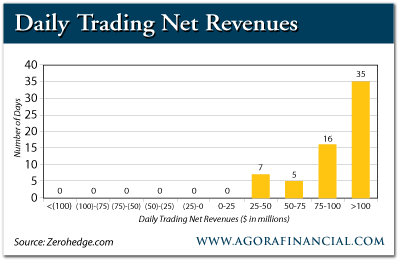Goldman’s Perfect Quarter
05/12/10 Laguna Beach, California – While the European Central Bank (ECB) was busy manipulating markets and making headlines Monday, Goldman Sachs was quietly revealing a different story of market manipulation…or something that walks and quacks very much like a market manipulation duck.
In an SEC filing, Goldman disclosed its first-ever “perfect” quarter. The firm’s proprietary trading desk navigated the first quarter without producing a single day of losses, the first time it had accomplished such a feat.
How is this possible? Please permit us to offer a simple explanation: It’s not.
Imagine a poker player who competes against skilled competitors for 63 sessions of 6 1/2 hours each, then walks away with a profit after all 63 sessions. Would that be possible? Not unless the poker player is holding a stack of aces up his sleeve. But Goldman accomplished this improbable feat. Its trading desk turned a profit on each and every day of the first quarter – that’s 63 trading sessions of 6 1/2 hours each, not counting whatever additional shenanigans Goldman was conducting in foreign markets.
There is something wrong with this picture…very, very wrong. And yet, Goldman trumpets this success as an example of something that is very, very right. “This is the first time we have reported zero trading loss days in a quarter,” crowed Samuel Robinson, a Goldman Sachs spokesman. “We believe it shows the strength of our customer franchise and risk management.”
An alternative interpretation would attribute Goldman’s uncanny trading success to the strength of its “political franchise,” subsidized risk-taking and various forms of de facto front-running. If, as James Howard Kunstler asserts, the US stock market has become “a robot combat arena where algorithms battle for supremacy of the feedback loops,” Goldman Sachs must control the “Supreme Combat Robot.” But we wonder whether this robot is abiding by all applicable securities laws, or vaporizing them with his special “Mega-fraud laser beam.”
“If you ever wanted to see what a monopoly looks like in chart form,” jokes Tyler Durden from Zero Hedge, “here it is:
 “The firm did not record a loss of even $0.01 on even one day in the last quarter,” Durden says. “The statistic probability of this event is itself statistically undefined. Goldman is now the market – or, in keeping with modern market reality, Goldman is the ‘house,’ it controls the casino, and always wins. Congratulations America: you now have far, far better odds in Las Vegas that you have making money with your E-Trade account.”
“The firm did not record a loss of even $0.01 on even one day in the last quarter,” Durden says. “The statistic probability of this event is itself statistically undefined. Goldman is now the market – or, in keeping with modern market reality, Goldman is the ‘house,’ it controls the casino, and always wins. Congratulations America: you now have far, far better odds in Las Vegas that you have making money with your E-Trade account.”
In an SEC filing, Goldman disclosed its first-ever “perfect” quarter. The firm’s proprietary trading desk navigated the first quarter without producing a single day of losses, the first time it had accomplished such a feat.
How is this possible? Please permit us to offer a simple explanation: It’s not.
Imagine a poker player who competes against skilled competitors for 63 sessions of 6 1/2 hours each, then walks away with a profit after all 63 sessions. Would that be possible? Not unless the poker player is holding a stack of aces up his sleeve. But Goldman accomplished this improbable feat. Its trading desk turned a profit on each and every day of the first quarter – that’s 63 trading sessions of 6 1/2 hours each, not counting whatever additional shenanigans Goldman was conducting in foreign markets.
There is something wrong with this picture…very, very wrong. And yet, Goldman trumpets this success as an example of something that is very, very right. “This is the first time we have reported zero trading loss days in a quarter,” crowed Samuel Robinson, a Goldman Sachs spokesman. “We believe it shows the strength of our customer franchise and risk management.”
An alternative interpretation would attribute Goldman’s uncanny trading success to the strength of its “political franchise,” subsidized risk-taking and various forms of de facto front-running. If, as James Howard Kunstler asserts, the US stock market has become “a robot combat arena where algorithms battle for supremacy of the feedback loops,” Goldman Sachs must control the “Supreme Combat Robot.” But we wonder whether this robot is abiding by all applicable securities laws, or vaporizing them with his special “Mega-fraud laser beam.”
“If you ever wanted to see what a monopoly looks like in chart form,” jokes Tyler Durden from Zero Hedge, “here it is:

Read more: Goldman's Perfect Quarter http://dailyreckoning.com/goldmans-perfect-quarter/#ixzz1quFKW1Bc
finish reading article here

No comments:
Post a Comment